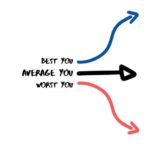Nick Del Bianco is a Canadian volleyball player who recently finished playing in his 3rd professional season for LUC Volleyball, in Switzerland. Over his career with the TWU Spartans, he collected numerous all-star awards, including the CIS Player of The Year in the 2014-15 season. Not only has Nick represented Canada on the indoor stage, but he was also a member of the beach national team for a number of years.
For anyone who has ever played with Nick, they would probably describe him as, “The guy you can look to when the pressure hits.” And for anyone who has played against him they might call him, “their worst nightmare.” Nick is well known for being a tactician of the sport who can pick you apart at the slightest hint of weakness. Alas, no matter which side you’re on, Nick is an incredibly smart player that you have to respect. I hope that through this conversation you can see why he is the way he is and potentially tease out a few lessons that you could apply to your game.

If you’d like to keep up with Nick you can follow him on Instagram @nickdelbianco and Facebook @ndelbianco. Also, keep an eye on him because he has something incredibly helpful for athletes coming down the pipeline.
Daily Athlete (DA): I wasn’t sure how things would turn out with this interview. Given the fact that I’ve known Nick for quite some time now and have spent a number of years as his teammate, I thought I knew everything there was to know about Nick Del Bianco. But I couldn’t have been more pleasantly surprised. Not only did this interview open up my eyes to different ways of thinking about simple problems, but it allowed me to see Nick from a different side that I had never really known. I got to know the inner mind of Nick and understand what makes him tick. I hope you enjoy some of my favourite insights from our conversation and can learn a thing or two from a man that I would consider to be the most competitive teammate that I’ve ever played with.
ON HIS EARLIEST SPORTS MEMORIES
NICK: “I was extremely competitive. To a fault. I remember I used to play soccer and when there was a game going on I would always have the score in my head. And if the coach made a mistake about the score I would correct him.”
“My dad was always a coach or an assistant coach. And they [his parents] were always at every game. But my dad was a big influence through coaching. I recently had a big realization that my dad, before every game, whether it was when he was coaching me or when I was in university, he would always tell me, ‘Go have fun out there, I want to see you smile.’ That was his big message to me throughout my whole life. And at the time I would think, ‘Oh great advice dad, thanks a lot.’ I would have a crappy attitude towards it. But now looking back, it’s probably the most important thing to me. Just going out, having fun and competing. It showed up later in my career, but it started at a very young age. It’s funny how its now clicking for me.”
THE POWER OF JOY
“It’s such a joy and blessing that we have this opportunity to play, and just realizing that again has been such a mental boost for my game…You don’t go through as many highs and lows when you just enjoy it.”

ON CHOOSING TO PURSUE VOLLEYBALL
“I had really good friends in the volleyball community… and I found success in other sports, but with volleyball it was success that I could feel good about. With volleyball, I had friends in it and I enjoyed the community around it.”
“[With volleyball] I thought it was a sport I could go further than in other sports. I just liked being around volleyball players because I could be around my friends. It was never a mindset that if I play volleyball now, I can go play pro later. Thinking about pro didn’t come around until my third year of university. In high school, I was thinking, ‘okay what university can I get to, now once I’m in university, let’s see which national team I can play for [beach or indoor], okay now what’s after university.’ Then once I was playing pro, I had to think about how I can make the most of this living situation. And I mean, it’s not like I’m making tons of money, but I’m having awesome experiences and saving money each season.”
“I knew that if I worked hard enough at any sport that I was playing, I could do something special with it. And that was always a belief that probably came from my parents and siblings. It was just the mindset that if you put your mind to it, you can do it. And it wasn’t necessarily a confidence in my ability. But a confidence in my belief that I could work really hard and get what I want.”
LESSONS LEARNED FROM THE BEACH VOLLEYBALL
“I learned how to be very professional at a young age. And that largely came from a couple coaches that I had – especially Kiara and Mischa. [They would say to me], ‘Okay you play volleyball, but what do you eat? Okay, you are eating that, how well do sleep? Okay, you’re sleeping you’re recovering, what are you doing in the weight room?’ It wasn’t just volleyball anymore, it was an all-encompassing thing. It was about performing well in life and that’s something I learned early on. I think that’s a large reason for why I was able to get to my level today. I just learned how to be very professional with how I treated this sport.”
“I 100% believe that in beach volleyball you can lose the game. The pressure is just way higher in beach volleyball and I learned that quickly. And it led to some of the angrier years of my life. It either breaks you or you overcome it.”
– How did you overcome it?
I don’t think I ever did overcome it back then. Sometimes I would enjoy it and play well, and sometimes I would be angry and get frustrated. It was a little up and down throughout my youth and junior career with beach volleyball. I honestly think coming back to beach now [after playing indoor] it has become a lot easier. And I clearly can see how ridiculous it is when you punt a ball across a beach and have a little tantrum on the court – and I used to do that – I’m not proud of it. But now coming back to beach I have more of a maturity towards it.

WHO DO YOU RELY ON WHEN YOU BREAK?
“With the amount that beach volleyball was able to break me, it was also able to rebuild me… So, my tolerance for handling pressure situations just got better and better because I was broken over and over. Because, at 16, we started competing against men and I was just getting destroyed by people I thought I could beat. It was just a pretty tough experience. But then having the support of my teammates and coaches to actually rebuild me was what allowed me to play in pressure situations. I had an environment that was okay with failure and was pushing me to be better. But at the same time also knowing that the process was – you are going to break mentally and then you’ll get better.”
– What makes a good coach?
“They might not be the most tactical or systematic coaches. But they do their job, they are good people, they are consistent with their message, and they always push you to work hard.”
LESSONS LEARNED AT A YOUNG AGE
“I learned early on that I never thought losing or performing poorly, was because of my coach. And that was a mindset I think I got from my parents. The coach did the best they could, they trained me throughout the week – when I perform bad, it’s not because of them. That’s a mindset that has allowed me to have good experiences with coaches.”
“You have the athletes who look for the scapegoat and then athletes who are almost too hard on themselves. Both can have their problems. But I would definitely lean towards the one who is looking internally for the answers.”
WHAT DO YOU BELIEVE LEAD TO YOUR SEPARATION FROM YOUR PEERS?
(FYI: For those of you who don’t know, Nick and I played in university together. Nick was a year younger than me, but by the time I was in my 4th year and he was in his 3rd, he was starting over myself and some other older players. In fact, Nick was probably our most consistent player, despite being one of the younger starters.)
“I don’t know how other people were off the court, but I felt like I was fairly professional with how I treated my self and the sport…And I honestly didn’t really look at my teammates with judgment, it was never really about others, and I know this sounds extremely selfish, but it was more that I needed to do this for me. And if other guys aren’t going to do the extra stuff that’s their choice, and maybe that leads to a little selfishness – but I’m okay with that.”

“I was always competing against the score, but I was also competing against anyone else on the court. I didn’t want anyone else to beat me. We could be in a drill winning 21-17, but at the same time, I was also competing with the guy directly across from me. And that was my mentality from my first year onward. I was always having this second competition. I think that allowed me to grow as a player. Because regardless of if we won or lost a drill, I would ask myself, ‘did I beat that guy?’ And I didn’t do it to make anyone look bad or to be a mean person, I did all that so I can be the best for my team. If you’re not your best self, you’re not going to be able to help others the best you can.”
DA: I love two things here: One, the idea of a “Second Competition”. There will always be the competition that everyone sees. But what often separates the high-performers is the internal game that’s going on in their little world. This is the one that is pushing them to always have their foot on the gas pedal, even though no one else cares about it.
Second, I think we all could use a little bit more selfishness in our training. Because if you let yourself fall to the level of others you will never rise above them when it matters. You have to think to yourself, “I’m going to get my reps in and if you guys want to join me, that’s great, and if you don’t that’s your choice.”
NICK’S MOST VALUABLE TRAITS
“My work ethic: That’s where my confidence comes from because I know that I can work hard enough to do anything I want.”
“Being a learner: When a coach tells me how to do something, I don’t just listen and hope I get it right, I try to learn the mechanics of how to do it.”
– What are the trade-offs of those traits?
“For hard working. It’s more about the sacrifices others have made for me. Because of my work ethic and getting to where I’ve been, other people have had to sacrifice their time and freedom. And it’s not necessarily my own sacrifice. My work ethic has been tough for other people.”
DA: I think having this mindset truly brings out a whole new sense of gratitude. When you think about all the people that have had to alter their lives for your benefit, you begin to become incredibly grateful for that gift they have provided you with.
NICK: “For being a learner. I would sometimes be too coachable and not find my own way. So, unless coaches promoted that mindset, I would do things exactly as I was told to do it. But maybe if I was able to have some more freedom with that skill, it could have been better. It wasn’t until I gave myself more freedom to learn my own way that I was able to make my own adjustments and get the results I’m looking for.”
SUFFERING THAT HAS LEAD TO SUCCESS
DA: This question is always on my mind when I look at successful athletes. So often, we only get to see the finished product as they perform flawlessly on the main stage. But if you think that they got to that level without suffering, you’re fooling yourself. In order to succeed at anything, you have to be willing to sacrifice certain pleasures or comforts and suffer through some uncomfortable moments.
NICK: “There are a couple things. You don’t have a normal life. The life of an athlete means you are tired almost all the time, on a daily basis. You sacrifice your weekends. That’s when you are trying to sleep the best and eat the best. Not when you are going to go out and party. You can’t just go out with friends on a Friday night because you are getting ready for your game the next day. You just don’t live a “typical” life. That can be hard socially.”
“Playing professional is such an amazing experience, it’s so rewarding to be able to do it and I’m very grateful for the opportunity. But at the same time, it can be very lonely. I’m extremely lucky that Taylor [Nick’s fiancée] is here with me because if she wasn’t I don’t think I would be the same person or volleyball player that I am. And yes, we have each other, but at the same time, we’re still lonely. There isn’t too much outside of us. It’s just not the same as life back home. And you have to be okay with that. You have to be willing to sacrifice being home. But I definitely think it’s worth it. Just through the experiences and the people we’ve met, what we’ve learned from living in a foreign country.”
“I don’t get to see how much my nieces and nephews grow through the years. And that’s a really tough thing. We’re over here for 8-9 months and in that time a kid can go from not talking to speaking in that amount of time. And you just don’t get to see that process. Life just flies by when you’re not there.”

ON GETTING THROUGH THE “DARK TIMES”
DA: Same idea as the previous question. There are dark times that we all go through, but no one ever really hears about them. We only ever hear about people’s dark moments when they rise from the ashes. We all have dark times and it’s those of us who figure out how to make it out to the other side with a positive mindset that end up achieving more in the long-term.
“I was in that kind of a situation last year where things just weren’t going very well. And I really had slow down and ask myself, “Okay, how do I push through this?”
And one thing that really helped me through that was, I was working very hard on the things I could control, and when things weren’t in my control, I was trying my best to enjoy them. For instance, the practice, my coach, or my teammates, none of that was in my control – but me playing volleyball, that has always been in my control. My goal simply became to be happy to play. Even if practice wasn’t great, I would have to find something I can enjoy from it. So I would go on walks, listen to podcasts, and read more, just things that brought me away from volleyball and gave me more joy in life. And through all that, it allowed me to play better. Just by having that time away from volleyball, I could come back more clearly to volleyball.”
“It’s not in my control how others react, but it is in my control how I choose to react to things. How much I enjoy playing comes from me.”
LEARNING FROM FAILURE
Story #1
“I was a part of a BC summer games basketball team. I was enjoying it, but the practices were in Mission so it was a really long drive [about an hour away], it was a big commitment, I was losing time with friends, losing time with things I thought were important to me at the time, it was tough. So, I decided to quit the team. I let my parents know and then told the coach. And for the first two days, it was great when I knew they had practice and I didn’t. But all of a sudden, I was thinking, ‘screw it, I want to be on that team, I want to go to BC summer games, I want to win that tournament.’ And this huge competitive side of me just came out. I was so devastated that I quit, so I tried to get on the team. And luckily, they let me back on as an alternate. So, it was great because I was back training, and working really hard. Then when they were making their decisions on who was going to travel I got a phone call, and they told me, ‘Thanks for coming back and being an alternate, you worked really hard, but because you quit the team we are going to stick with the original 10 players who were there the whole time.’”
“After the call, I just remember going outside to our basketball hoop and I must have played by myself for 6 hours or so. I was just so frustrated at myself and upset. I was just glued to the court. And looking back I remember telling myself how dumb it was of me to quit the team. And that just forced me to realize what I value. I had to ask myself if I really valued the couple extra hours that I got if I didn’t do anything or did I value the chance to play at a high level. Do I want the “normal” life or do I want to be challenged and pushed? And that was a big moment in my sporting career.”
Story #2
“Another one that sticks with me has to do with something that I believe shows the reason for why I am the way I am when I play sports. It was at the UBC tournament when I was in grade 11. We lost against Semiahmoo, and it was a quarterfinal game. I was super angry after we lost because I got the last set and I hit the ball out. I remember I put my hands in the air and gestured towards my setter, for making a bad set. And after the game was over we had a team meeting, but right after that I was pulled aside by my coach and was [verbally] lit into. He pretty much told me, that it’s not someone else’s fault when we lose a game and it’s not your fault either. But that is no way to treat a teammate or anyone for that matter. You don’t blame others for your problems or the team’s collective problems.”

“And that’s when I really started to internally tell myself, ‘I didn’t get the kill, but what can I do better next time?’ Instead of wondering what my teammates did wrong. It’s on me and I have to decide what I can I do to better that situation next time.”
“And that was something that stuck with me for the rest of my career. And whenever dealing with setters I try my best, and I think most setters would agree with me, that I don’t complain about sets being off. Almost to a fault. To the point that they were trying to make the sets better for me so that I was in a better position to hit, but I was always saying, ‘oh great set, I’ll do something better next time. I won’t hit out next time.’ And it was never their fault, it was always on me to look for ways to better the situation. That was something I learned in grade 11, but it has really stuck with me throughout my career.”
NICK’S CHECKLIST FOR A GOOD DAY
What I try to do:
- Drink a liter of water when I wake up
- Lunch is the biggest meal of the day
- Find what benefits me that day. Don’t get stuck or reliant on certain routines
- Do something fun that can benefit you in other ways outside of sports
- Have some time to be alone, clear your head, reflect and decompress
- Sometimes it’s a nap.
- Regular bedtime.
- Life happens, don’t stress over something being slightly off.
THE ONE HABIT EVERY ATHLETE SHOULD CONSIDER
“Pay more attention to what you are putting into your body. That is the single most important thing when it comes to being healthy, performing well in your sport, being happy, managing stress. It just encompasses everything in sport and in life. Everything you put into your body matters. So, you should try to start being more aware of it. And aware of how things make you feel, both positively and negatively. Find a way of eating that works for you.”
GOALS CHANGE AS YOU CHANGE
Pre-university: “I wanted to be the absolute best. Didn’t matter who I was up against or who I was compared to – I wanted to be the best.”
Post-university: “My future goals have shifted. I really want to enjoy playing and do whatever it takes to just enjoy volleyball. Obviously being the best is part of me, but there is a definite shift towards enjoyment. Because at this stage in my life, if I’m enjoying what I’m doing it means I’m playing well.”
THE ONE QUOTE THAT NICK LIVES BY
“Not necessarily a famous quote, but my parents telling me to ‘go have fun’ is something that has really come around now and really resonates with me.”

That’s a wrap on this interview with Nick Del Bianco. I hope you came away with something useful. Comment below on your favourite insight. Or share it on IG, FB, TW, or SC.
And if you’re interested in seeing what Nick is doing next, go check out www.athletewellnessacademy.com — There you’ll find out more about the coaching and courses available to help you take a holistic mindset and approach towards your performance.
-Derek
PS – Are you looking for a simplified way to enhance goal focus, build lasting habits, cultivate more passion for your sport & life, and ensure that you never miss an opportunity again. Check out The Daily Athlete Journal. And don’t forget to use the coupon “FIRST10” to get 10% off your first purchase. Get your copy today, before your competition beats you to it.





